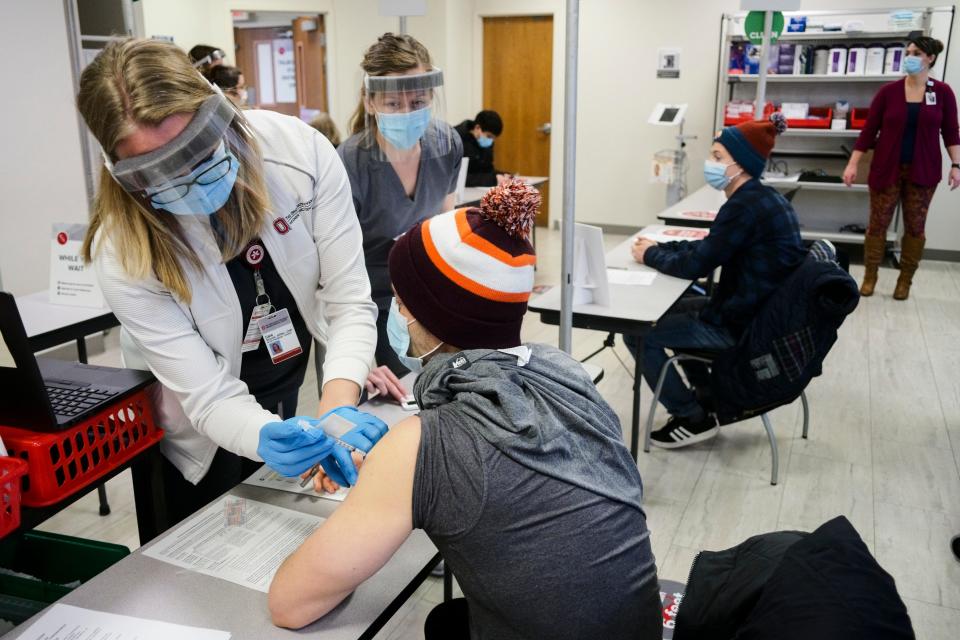Staying Apart, Together: The cavalry is coming

Happy Tuesday to each and every one of you.
It actually feels like a happy Tuesday for the first time in awhile, as I watch videos and images of health care workers across the country get urgently needed doses of Pfizer's COVID-19 vaccine. People are literally dancing in the street, like the staff of Boston Medical Center dancing with glee to Lizzo to celebrate this moment. And Moderna's vaccine candidate is likely not far behind.
"This is an emotional release, in my mind," Spyros D. Orfanos, director of New York University's post-doctoral program in psychotherapy and psychoanalysis, told our network paper the Bergen Record. "It varies from individual to individual. People have a wish to be relieved of this extraordinary anxiety and worry they have. It makes sense that the first sign, the first light in the darkness, they would feel relief."
There is joy in this moment, but also there is still fear and trepidation. It will be months before the general population starts getting vaccinated, and longer until enough of us are vaccinated for our lives to start returning to normal. The safety and security we all crave is closer but still not totally within our grasp.
We have to remain vigilant, remember that the vaccine is one more weapon in our arsenal in the fight against the pandemic, but mask-wearing, social distancing, staying home and avoiding large groups are still vital. Yes, there is still a long haul ahead of us, but for so long during the pandemic there was no end in sight. Hopefully the light at the end of the tunnel offers us the renewed energy we need to keep each other safe until the cavalry reaches us all.

Today's FAQs
OK, the vaccine is here, but it's understandable if you still have questions about it.
Our amazing USA TODAY Healthcare team of Adrianna Rodriguez, Grace Hauck, Elizabeth Weise and Karen Weintraub have been diligently reporting on every development in the vaccine race. They have also been collecting and answering questions from our readers, with the help of public health experts. I wanted to share with you some of their important information.
If you already had COVID-19, should you still get vaccinated? People who have had COVID-19 "may be advised" to get the vaccine, "due to the severe health risks associated with COVID-19 and the fact that re-infection with COVID-19 is possible," according to the CDC. If you've had COVID-19 and recovered, you have what's called natural immunity. Studies have shown natural immunity to COVID-19 may last months to years. Immunity from a vaccine is called vaccine-induced immunity, and it's unclear how long that may last.
Will the vaccine be safe for pregnant women? Historically, major vaccines have not been tested during pregnancy because of concerns that both the pregnant person and fetus would be at risk for complications. Pregnant and nursing people were not included in the Pfizer/BioNTech study, so there is no data to suggest whether they should avoid vaccination. Dr. Peter Marks, who directs the Center for Biologics Evaluation and Research at the FDA, said Saturday that pregnant people, children and those who are immunocompromised should discuss vaccination with their providers and "will need to consider on an individual basis."
What are the side effects of the COVID-19 vaccine? Americans will likely experience at least one side effect from the COVID-19 vaccine, but doctors say that’s normal and you should still get vaccinated. For the vaccine by Pfizer/BioNTech, many trial participants endured side effects for a day or two after getting their shots, particularly the second one. The most commonly reported side effect among vaccine recipients under age 55 was a sore arm, followed by fatigue (60% after the second shot); headache (52% after the second shot); other muscle aches (37%); and chills (35%).
You can read more questions and answers here. You can look up your state's plans for vaccine distribution here, which will help you discover where you are in the line for vaccinations. Pfizer's vaccine is coming to nursing homes next week.

Today's cybersecurity tips
More people are shopping online this holiday season due to the pandemic, and unfortunately scammers have noticed.
"We are definitely seeing a surge in online holiday shopping – not only because the world has become increasingly digital in recent years, but also due to COVID-19," confirms Judith Bitterli, vice president of Consumer Marketing at McAfee. “As a result, hackers are capitalizing on this trend by attempting to lure consumers to fake deal pages and other illegitimate websites designed to steal their personal data."
Here are a few tips for avoiding scams as you exercise your generosity this year, according to USA TODAY Tech columnist Marc Saltzman.
Look for the lock: Reputable websites use technologies such as SSL (Secure Socket Layer) that encrypt data during transmission. You will see a little lock icon on your browser to confirm it’s a secure connection. Pro tip: Many cybersecurity experts says it’s safer to shop from within a store’s app than the web.
Pay securely: Only shop on sites that take secure payment methods, such as credit cards, PayPal, Apple Pay or Google Pay. Alternatively, consider using gift cards, which don’t require you to share credit or debit card info. When shopping at an unfamiliar merchant site, look for security seal of approval, such as DigiCert, Better Business Bureau, and VeriSign.
Update your software: Whether you shop on a smartphone, tablet, laptop or desktop, always keep the operating system up to date, to avoid cybercriminals exploiting a weakness.
Read more cybersecurity tips here.

Today's reads
Our Money reporters explore what the stock market indicates about the 2021 economy.
Restaurants are really struggling right now. Here's how to support your local foodie scene this holiday season.
Our top 10 albums of the year are out, courtesy of my colleague Patrick Ryan. His top choice was very exciting for Taylor Swift.
All about kosher wine if you need it for continuing Hanukkah celebrations.
We break down the crazy end to Monday night's Ravens/Brown game.

Today's pet
No dog or human has a bigger smile than Baxter the pug.

"He has brought us many smiles during our time at home over the past months," says human Teri Norris. "In this photo, taken on our porch, he appears to be giving me a giant smile."
This article originally appeared on USA TODAY: The cavalry is coming

